Dates: July 1 – 7, 1885
Location: Sibley Park, Mankato, Blue Earth Co., MN
Find it today: Map
From southbound US-169, take the Riverfront Drive exit, turn right on Owatonna Street, turn left on Sibley Parkway and travel to the park.
The baptisms: Camp meeting baptisms were conducted in the Minnesota River.
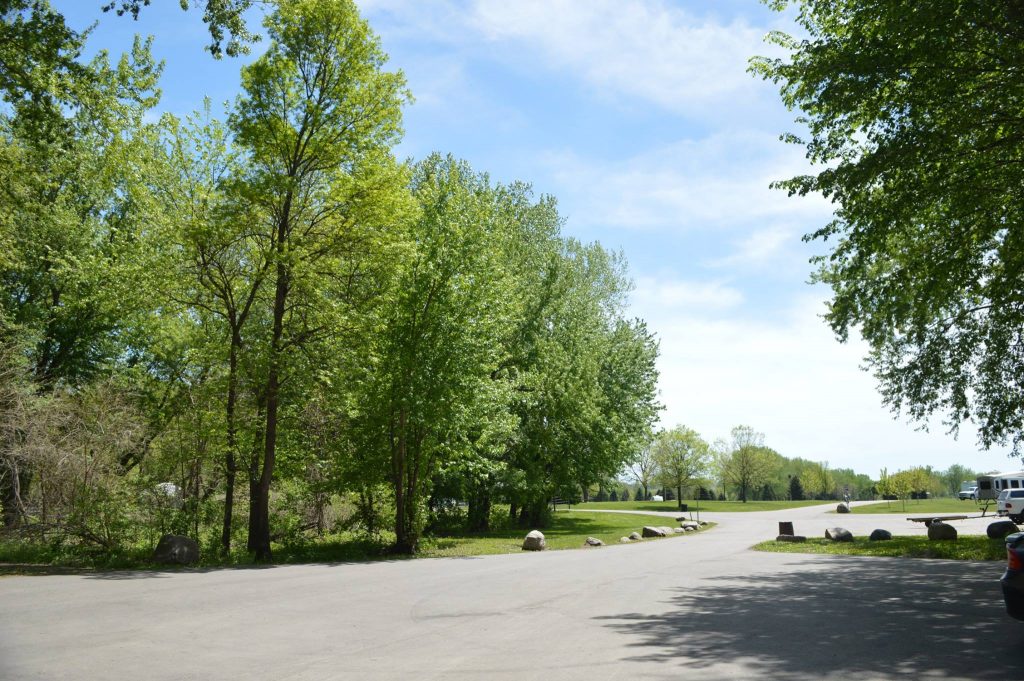
A brief history of Sibley Park: The Blue Earth County Historical Society has published an excellent history of this park which provides insight as to the reason why it was an inviting site for the 1884 and 1885 MN SDA Camp Meetings. We quote in part, an article from the society’s Blue Earth County Historian (it is worth reading the entire article which starts on page 9):
The park was named after General H. H. Sibley, who established a trading post on Sibley Mound in the 1840s or 1850s. Sibley, who became Minnesota’s first governor, called his post “Sibley’s Mound.” Later, after two brothers-in-law from Virginia, Henry Jackson and Parsons King Johnson, started the settlement that would later grow into the city of Mankato, the park area became a popular farm settlement with incoming families. From the very beginning, however, the land was regarded as a potential site for a beautiful city park.
Though it is known for its beauty now, it was also involved with some terrible and grisly events. In 1862, it is believed that Sibley Park was home to Camp Lincoln, where 303 Dakota warriors were housed prior to their trials by a military tribunal in Mankato. This was at the end of the Dakota Conflict, and though Lincoln pardoned 264 of the Native Americans, another 38 were executed. Though the executions that followed did not take place at Sibley Mound, the sentenced warriors were confined there for some time before being transferred to a location closer to the execution site. This execution was the largest mass-execution in the history of the United States.
This history did not deter families from continuing to settle and thrive in the Sibley area. As Mankato blossomed, so did Sibley Park, and as more people gathered across the land, more public gatherings took place. A major part of Sibley Park’s early history was the fairs that were held there. Fairs were actually held at the park before it was a city park; in 1884, the Southern Minnesota Livestock and Fair Association set up a fair at Sibley Mound. Frank Metill, Ed Weaver, Martin Joran, Henry Himmelman, Jr., P.H. Carney, C.E. Wise, and George Pond were the fair’s chief promoters. This first fair was called “the best ever held in Minnesota” by The Mankato Free Press and had a grandstand specially built, a livestock building, and a floral hall, besides horse races at the horse track. It also had many artful items on display, including a quilt created by Mrs. R.D. Hubbard and wood carvings by Miss Clara Piper. In 1885, another fair was put on with even more exhibits by Mankato area business and industry leaders.
Sibley Park became a true city park in July of 1887, when town officials bought about 120 acres of land from the Givens family for $13,088. Later that year, the city also bought the Southern Minnesota Stock and Fairgrounds, which were close to Sibley Park. This fairground included a racing track and a grandstand.
SEVENTH DAY ADVENTISTS.
PROCEEDINGS OF THIS DENOMINATION AT THEIR CAMP-MEETING.
Sibley’s Grove Filled with Attentive Listeners to the Truths Expounded by the Learned Teachers – The Exercises in Detail.
[SPECIAL CORRESPONDENCE OF THE TRIBUNE]
MANKATO, July 3. – This has been the second day of the big camp meeting at this place. The meeting in point of magnitude exceeds the highest expectation of the managers. There are at present 175 tents on the ground and all are fully occupied, and arrivals are still very frequent. Among the late arrivals are Elders A. D. Olsen, president of Dakota conference; A. J. Breed, Madison, president of the Wisconsin conference; John Olive, Prescott, Wis.; C. M. Chaffee, Byron; A. G. Daniells, Sioux City, Iowa.
The interest in the meetings is becoming greater at each step, though it is of a subdued quality rather than of the demonstrative kind which often accompanies camp meetings. The services are as orderly as in any church.
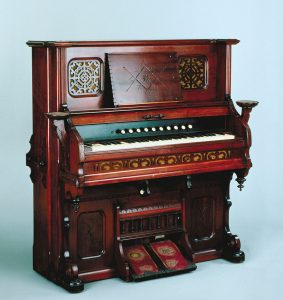
A decorous choir and an organ sits in the “amen corner,” and these old-fashioned responses are rather few, being felt rather than expressed. They do not cultivate the revival spirit as it is usually manifested at such gatherings, regarding it as too emotional in nature to be permanent. But a broad scope of religious duties are presented, and the hearers are urged to aim themselves to a life of devotion to the cause of Christ with the self-denial and cross-bearing which the Great Master so fully identified with that work.
The Seventh Day Adventists look upon high-sounding titles with no particular favor, the only one which their ministers accept being that of ”elder,” and from the president of the general conference down they all stand on that level. In this they are actuated by the words of Christ: “Be ye not called Rabbi, for one is your master, even Christ; and all ye are brethren.”
There are quite large congregations of Scandinavians and Germans in attendance and services are held in these languages two or three times daily. Often the encampment will resound with the blended songs of three languages, creating a harmony which is better appreciated and understood in heaven than here.
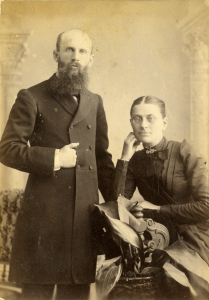
THE BIBLE STUDY last evening, conducted by Elder G. B. Starr, was of peculiar interest. Mr. Starr has charge of the Chicago mission, having a company of Christian ladies and gentlemen who devote their time to the circulation of denominational and other religious reading, and more especially to encouraging the systematic study of the Bible; and for this purpose, they visit from house to house with their Bibles, and to those who make them welcome they give instruction in the method of understanding the Bible and the great truths which it contains.
Similar missions are now established in the principal cities of the United States, and the work is to be rapidly extended, as it is an efficient means of doing good, and many are becoming enlightened in regard to that which was once dark and mysterious. The average Seventh Day Adventist has not delved very deeply into the mysteries of geology, but where they are sounded on the Bible they can generally give a reason for their hope in a way which shows familiarity with the word.
Elder Starr’s special work at this meeting is to encourage and instruct others in entering the missionary work. It is expected that quite a large force will engage in this enterprise in the cities of Minnesota the present season, particularly in Minneapolis and St. .Paul. No one will say that it will come amiss.
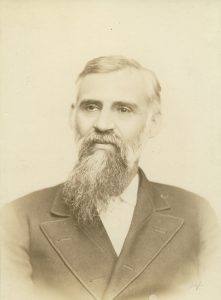
Courtesy of the
Ellen G. White Estate, Inc.
The discourse last evening was by Elder George I. Butler, being an exegesis of Isaiah, LVIII chapter, especially the first verse, which reads: “Cry aloud, spare not, lift up thy voice like a trumpet, and show my people their transgression, and the house of Jacob their sins.” The terms “house of Jacob,” “Israel,” etc., are used to indicate the people of God in every age since the days of the patriarchs, for Christian as well as Mosaic times. God has but one people, the true Israel: the gentile Christians being grafted by faith into the parent stock and thus all become children of Abraham. The call to repentance is usually directed to the sinner. But here the message is addressed to God’s people who are living in transgression and indulging in sins against God. Though from the context we learn that they were a people who seek God daily, delight to know his ways, and take delight in approaching unto Him. From which it can only be concluded that they are self-deceived and do not thoroughly understand their true condition. The human heart is deceitful above all things, and clings tenaciously to earth and sin. Thousands are satisfied with the outward forms of religion while their hearts are far from God.
By a careful reading of the chapter we learn that the words apply to our own times. A time when the ancient, time-honored Sabbath of Jehovah, the seventh day, sanctified at creation, is being trodden under foot. And a blessing is pronounced upon him who will turn away his foot from the Sabbath, from doing his pleasure on God’s holy day. The prophet further describes the time as one when “judgment is turned away backward, and justice standeth afar off from truth is fallen in the street, and cannot enter.” This scripture is intended to convey a picture of the last days. And we can see plainly that the prophet would say to our generation: “THOU ART THE MAN.”
We should not be cynical in regarding the conduct of others. But God has here pointed out clearly the condition of things in our own times and society and commands his faithful servants to “cry aloud, spare not.” It is pleasant to hear agreeable and comforting words which lull to slumber but those things which arouse us to a knowledge of our true condition are most profitable. The true witness speaking to the Laodicean church, the last phase of the Christian church, shows them faithfully their true condition. That while they esteem themselves rich and increased with goods, and having need of nothing, they are in fact in a destitute and deplorable condition. Every illustration that we have of the last days shows the same facts, lack of faith, worldliness, love of pleasure, and pride. As we ask ourselves the question, “Is it I,” we must acknowledge that all these things are too painfully expressive of the condition of things about us. And we can bring it closer to our own hearts, for God’s professed people are indulging in the same deadly evils.
We do not have to refer to the religion of continental Europe to see these things exemplified. There is everywhere a lack of the true and meek spirit of Christ, Men who profess to love God cherish hatred to their fellow-men. The time and strength of the minister is frequently taxed to preserve that degree of peace which will enable church members to live together at all. Without the spirit of Christ we are none of his, no matter what our name or profession may be. The world around us is hungry for the word of truth, while the hearts of the professed Christians are often filled with debate and smiting with the fist of wickedness.
This is the cause of such spiritual darkness. But there is a better place for the people of God. In this chapter are precious promises to those who with true and humble hearts will seek to devote themselves to the work which the love of Christ would impress upon each of his disciples. “Then shall their light break forth as in the morning.” “The Lord shall guide thee continually, His glory shall be thy reward.” Get out of self and labor for Christ, should be the motto and effort of every one. So shall he be “like a watered garden, and like a spring of water whose waters fail not.”
A MEETING OF THE CONFERENCE was called this morning. Fifty-six delegates were present, representing forty-one churches. During the year a mission has been started in north Dakota under the auspices of this conference, and as the result of labor during the past few months churches have been formed at Fargo, Hamlin, Michigan City, and Reynolds, and they were now taken into the conference with their delegates.
A resolution was introduced for the more general adoption of the tithing system as a means of supporting the ministry. According to this system, which has become quite common among the Seven-Day Adventists, one-tenth of the income is paid into the treasury of the church, then sent to the conference treasury, from which it is paid out to the ministers on the order of the president. An auditing committee of six laymen is appointed at the annual meeting, who receives the ministers’ annual report of labor, and assigns to each minister his weekly salary, according to the degree of faithfulness he has manifested, and other circumstances which should be considered. The system is not made compulsory upon any, but is strongly recommended upon the ground of expediency and scripture precept. Its advantages are several. It is equal; it guards against covetousness; it provides for the preacher, and relieves him from an embarrassing situation, and above all, to the Adventist, “the Bible says so,” and that settles it.
One of the most interesting portions of the daily program is the hour of family prayer, 8 a. m., when from more than a hundred tents the voices of the campers are raised in devotional song. The volume of harmonious discord is indeed thrilling and impressive to the listener sitting in the center of the camp.
Again at 10:30 ELDER BUTLER TOOK THE STAND and preached one of his characteristic, earnest sermons, from the fullness of a heart which is carrying a burden for the good of his people. The subject chosen was Consecration of Heart vs. Consecration of Feelings, and the discourse was directed against the largely prevailing idea that genuine religion consists of exuberant and expressive feelings, rather than a deep settled conviction of duty. Several passages of scripture were read and commented upon as having a bearing on the subject of true religion. Colossians 1:9-10 was first cited. The apostle desired that they might be filled with a knowledge of God’s will, walk pleasing unto him, being fruitful in every good work, and increasing in the
knowledge of God.
Here is presented to us the principle features of a Christian’s experience.
A Christian should not be a man of a narrow, contracted view, and a mind which can only run in one channel, thereby befitting the work of God and crippling his own usefulness. He should produce fruit in every branch of the Christian work hence, it is necessary be should have an experience in all those thing [sic] which pertain to Godliness. His experience must be a living, growing one. A man who has ceased to grow has ceased to live like a plant gone to seed, a thing whose usefulness is in the past.
In Romans xi, 1, the apostle beseeches us to give ourselves unreservedly to God. It is reasonable and right to do this, since God has upon us a three-fold claim as our creator, preserver and redeemer. But this sacrifice must be a living one. God does not want dead sacrifices. The sacrifice of death has been made in Christ. We are to live and grow in him. Some boast of an instantaneous work which has raised them above the sin and temptation of this world, so that they are now holy, while thier [sic] lives show unmistakably the characteristics of human weakness. It is a delusion. Sanctification is rather a work accomplished in us by the means which God has provided. They are obedience to His truth under the guidance of the Holy Spirit. We are to become sanctified wholly, not simply in our own esteem, but in every thought and emotion, in every power and talent, consecrated to God by a living sacrifice and every day of our life a tribute to His glory and a day’s work for his cause. The test of sanctification is not in our feelings, but in the word of God, which will judge us at the last day.
The Minneapolis Daily Tribune, July 5, 1885
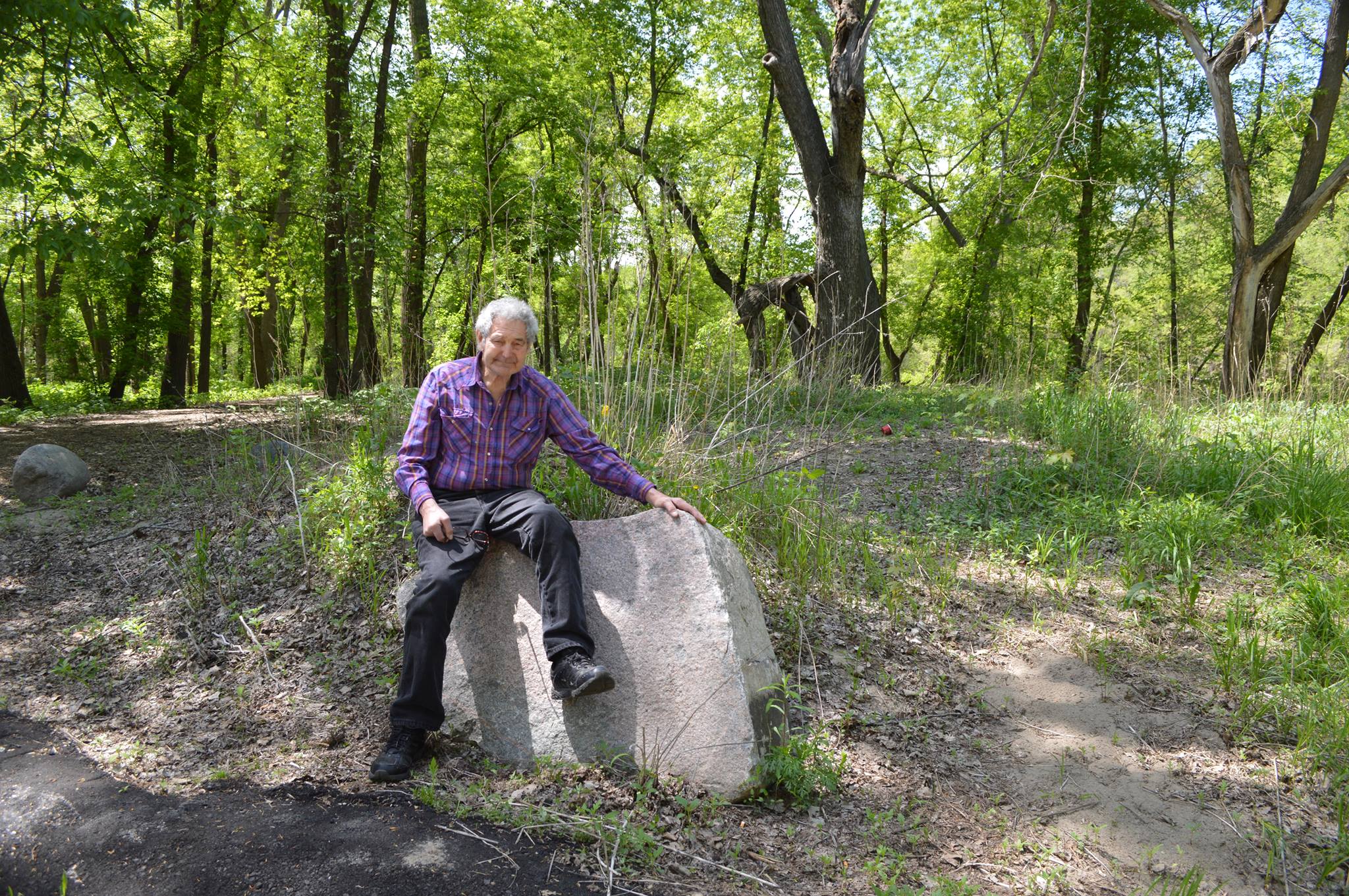
THE MINNESOTA CAMP-MEETING. This meeting was held at the same place as last year, on a high mound about two miles from the city of Mankato. The location is a pleasant one, but is too far from the city to be of easy access to the large body of the people. Over and over we have seen the necessity of locating our camp-meetings near the people if we want to have a large attendance. The people will not walk two miles out and back to attend the meeting, or pay twenty-five cents to be carried, unless there is something more attractive than religious meetings are to the generality of the people. We believe that if the meeting could have been close to the city, three times as many people would have attended.
The Methodists held a camp-meeting on the same ground about two weeks before. It was a small affair, and but thinly attended. Ours was a large meeting of our own people, and considering the. circumstances we had quite a representation from outside friends. There was an excellent feeling towards us in the community. The brethren have managed so as to secure the good will of the citizens to a very commendable degree.
The camp-meeting proper was preceded by a workers’ meeting of nearly a week. Eld. Olsen, the other ministers, and the leading brethren were in attendance, working and preparing for the camp-meeting by erecting tents, etc., etc., and holding several religious services each day. They sought the Lord, and obtained a good measure of his blessing before the camp-meeting commenced. These preliminary meetings are excellent; and when the camp-meeting continues only one week, it seems really important that some such preliminary services should be held, that everything maybe in readiness by the time the brethren come on the ground. Besides, it gets everything into splendid shape, so that when the meeting commences full attention can be given to the religious interests of the occasion.
There were nearly one hundred and sixty tents on the ground, and upwards of one thousand of our people. There were several excellent features in the organization of the camp that are not always seen on camp-grounds. There were plenty of tents for holding Scandinavian, German, youth’s, and children’s meetings, so that these could be carried on whenever there was time for such services, without conflicting with each other. There was also a good dining tent to accommodate those who wished to get meals on the ground. And there was one thing we do not remember of seeing in any other camp-meeting – a reception tent for visitors, and especially for ladies with little children. It was pitched close by the large pavilion, so if a child worried it could be taken there. It was well supplied with easy chairs and cot beds, so that the little ones could roll around when it was very warm and keep cool, and yet the mothers could listen to what was being said. Quite a number of them expressed their highest appreciation of this kindness. We really think it is a commendable plan to have some place for those mothers who want to hear the preaching and yet have children to care for.
Special preparation was made for getting full reports of the meetings into the St. Paul and Minneapolis daily papers. Reports from a column and a half to two columns in length were given each day in each of these large papers, and were written by Elds. W. C. Gage and G. C. Tenney. These papers are read by many thousands of people, and we were indeed glad that these opportunities were given to place our views before the people. It requires much work and thought to do this reporting business in the way it should be done, and doubtless the time will come when it will have more attention than it has ever before received among us. Efforts were made to have the discourses so prepared that all the leading thoughts in each would be presented; especially those relating to this work and its progress. We look for the time when reports of our work will go out through all the leading papers of the land, and this, through the help of God, will result in hastening the loud cry of this message. The time has come when we want to increase our efforts and make plans to spread the truth through the world. This will not be nearly as difficult considering the size of our body and the means at our command as the work of our pioneers in the infancy of this message. They had to labor under greater obstacles than we now have. The public are ready to listen to the truths of this message, and the greatest hindrance to the progress of this work is the indifference and lack of zeal among our own people. It seems impossible to bring many of them where they have a proper sense of the importance of this work. These will no doubt drop out by the way, and others will come in and take their places and crowns.
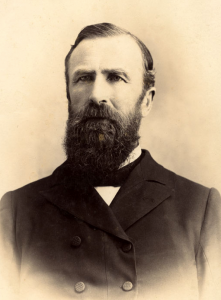
Courtesy of the
Ellen G. White Estate, Inc.
There is a very marked increase in the work done in this Conference during the last year or two, and the labors of Eld. O. A. Olsen have been highly appreciated. The state of union and good feeling among the Sabbath-keepers has been very marked, and no one questions the wisdom of his connection with the Conference up to this point. The increase in the tract and missionary work and the amount done in the circulation of our publications and in other important directions has been very great indeed. The brethren seem to be united now heart and hand, and there is nothing to hinder the Conference from making the most rapid progress if the brethren generally will take hold and help.
In the Conference report the reader will notice the change in the presidency, Eld. G. C. Tenney being elected to fill the place held by Eld. Olsen. This was not because of any dissatisfaction, but solely because Eld. Olsen felt that the time had come for him to once more devote himself to the Scandinavian work, which he feels that God called him to fill years in the past. He was only elected president of the Minnesota Conference to relieve a special difficulty that existed and to help the work over a difficult place. And now that those obstacles are removed and progress is being made in the work, he feels that he must give himself to the work among the Scandinavian people. This part of the work is becoming very important. Large numbers of this nationality are found in Michigan, Illinois, Wisconsin, Minnesota, Texas, Iowa, Nebraska, and other States. Our most important works are being translated into that tongue, and these books must be circulated; and here is a large field of usefulness. The work increased very rapidly under Bro. Olsen’s labors before he became connected with these Western Conferences; but while bearing the burden of all these responsibilities connected with the Conferences he cannot carry it forward as he could before. Very likely Bro. Olsen will go over to Europe and spend a season there before another year passes by. This will be a help to the cause there and a help to him in a better acquisition of the language. Therefore he will need the present year to look after many of the interests in the Scandinavian work in this country. He therefore sees the necessity of dropping his connection with these State Conferences and devoting his time to this branch of the work. Eld. Tenney has had considerable experience with Conference work in the past, and we trust that this selection will prove a benefit to the cause in Minnesota.
Our religious meetings were interesting, and the people responded to the stirring truths adapted to the present stage of the work, and seemed to feel the importance of taking hold with greater energy. On the Sabbath nearly two hundred came forward for prayers. This was not a general call to all of our brethren and sisters who felt the need of a greater spiritual life, but to those that were specially backslidden or who had never made a profession. The Spirit of God softened many hearts. We felt that it was very good to be there.
Many friends were present from the outside and from other churches. These manifested a deep feeling, and were greatly impressed with the earnest interest shown in the meetings. The Methodist minister of the place was present at quite a number of the services, and at times seemed deeply affected. The people that attended all manifested a friendly and courteous interest in our work. The meetings on Sunday were attended perhaps by a thousand or more not of our faith. These gave excellent attention, and seemed to be highly pleased. The truth was faithfully presented to them, and we hope that much good will result.
On Monday our meetings were interesting and profitable. About $2800 were pledged for the missions and South Lancaster school. Two-thirds of the twenty thousand dollars pledged last year is yet unpaid, which of course makes it very difficult to raise money for other purposes. Earnest efforts were made to increase an interest in the canvassing and missionary work, and to bring up the public sentiment on the tithing question. Our revival service on Monday forenoon was profitable. A large number came forward for prayers, and quite a deep feeling was manifest. Upwards of seventy were baptized.

Tuesday morning the meeting closed with the ordination of Brn. William Schram, W. B. White, and H. P. Holser to the ministry. The blessing of the Lord was present, and all felt confident that these brethren would make faithful workers.
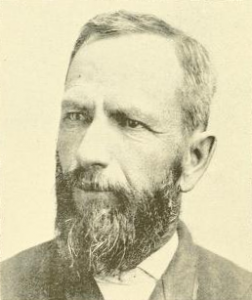
Eld. Starr remained with the members of the Conference Committee and all the brethren who were going out to labor, to give further instruction in Bible readings and other missionary work. We have never seen the time when the Minnesota Conference had before it such a bright prospect as at present. If the brethren take hold with interest; we shall see a great number brought into the truth in the near future. The attendance was larger than at any other Conference we have met with excepting Michigan, though the membership is about the same there as in Wisconsin and Iowa; yet a much larger number attend the camp-meetings, and thus show their interest in the work. These other Conferences will be left far behind if they do not manifest a deeper interest in attending these important meetings.
We believe the plan is to hold the next camp-meeting in Minneapolis, close to the city, where we can get access to the people. The influence of these two meetings at Mankato has been very marked. We have never attended a camp-meeting where there seemed to be a better spirit of friendliness on the part of the people generally. Much of the prejudice that existed has been broken down. This has been because those managing have tried to show a friendly interest in the welfare of the people. Instead of arguing, contending, and fighting, they have shown a desire to treat them kindly, and interest themselves in their condition.
G. I. B. – Review and Herald, July 14, 1885